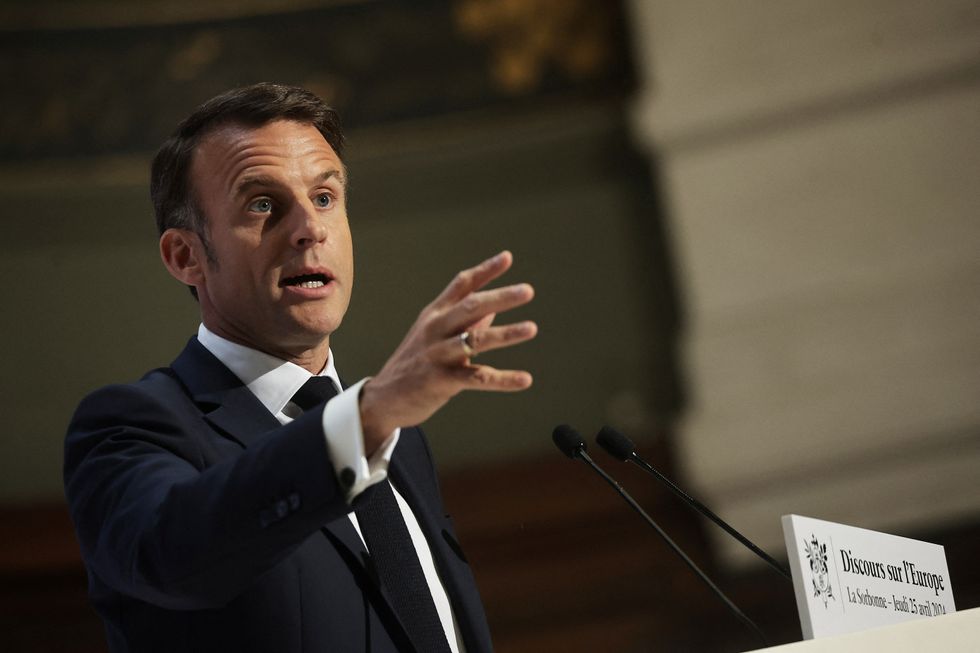Adam Chapman
Guest Reporter
French Prime Minister Michel Barnier could pave the way for a Marine Le Pen victory in France if he forces through a controversial new legislation without a parliamentary vote.
It comes as the stock market braces for a no-confidence vote on the 2025 budget that could topple the government.
The CAC 40 index experienced a sharp drop today, with the index falling by 1.2 per cent - its lowest point to 7,146.02 points - as turmoil gripped the country.
The spread between French and German 10-year bond yields have widened to levels not seen since the Eurozone crisis.
Barnier's social security financing plan, which he is expected to present today, faces stiff opposition from both ends of the political spectrum.
Le Pen, leader of the hard-Right National Rally (RN), has branded the Government's 2025 budget as “bad, unjust and violent", and has criticised several aspects of the latest legislation.
These include cuts to employer social contributions, ending inflation-indexing tensions and plans to make the prescription drug reimbursement policy less generous.
Le Pen has suggested that Barnier will feed the beast by not granting RN concessions over the budget.
"Avoiding saying that he respects RN voters is the best way to keep our voters asking us for censure,” Le Pen told Le Monde.
Several left-wing parties also oppose the plan for its austerity measures, which they believe would disproportionately affect the working and middle classes, reduce the quality and accessibility of public services, and further weaken the social safety net in France.

Despite the widespread opposition, Barnier can force through the legislation today by invoking Article 49.3 of the French Constitution, which allows the government to pass a bill without a vote in the National Assembly.
The RN has threatened to support a motion of no confidence against the government if it triggers this constitutional mechanism.
This could lead to the toppling of the government if the left backs the motion.
Such an intervention would be a win-win for Le Pen.
By threatening or actually supporting a no-confidence motion, the RN leader can exert significant pressure on the government to adopt some of her party's policies or to make concessions on key issues like budget measures, tax policies, or social reforms.
Should the no-confidence motion pass and the government fall, it could lead to either a new government formation or potentially snap elections.
If the electorate is disillusioned with the current administration, this could be an opportunity for Le Pen's party to gain more seats or even a significant role in government formation.
This scenario could be particularly beneficial if the RN's political strategy and messaging resonate with voters during such a chaotic period.
There are signs it already is: Le Pen maintains a strong polling position ahead of the 2027 presidential election.
LATEST MEMBERSHIP DEVELOPMENTS

Le Pen's party has gathered momentum since French President Emmanuel Macron called a snap election following his party's defeat in the European Parliament elections in June.
The snap election did not result in the expected consolidation of power for Macron's centrist alliance. Instead, it led to a fragmented parliament and a strengthened right.
Her electoral prospects might be improving but Le Pen is facing legal challenges that could jeopardise her chances of seizing power in three years.
The RN leader and more than 20 senior party figures are accused of embezzling EU funds by hiring assistants who worked on party business rather than for the European Parliament.
The Paris prosecutor has requested a five-year prison sentence and a five-year ban from political office for Le Pen if convicted, which would prevent her from running in the 2027 presidential election.
Find Out More...
It comes as the stock market braces for a no-confidence vote on the 2025 budget that could topple the government.
The CAC 40 index experienced a sharp drop today, with the index falling by 1.2 per cent - its lowest point to 7,146.02 points - as turmoil gripped the country.
The spread between French and German 10-year bond yields have widened to levels not seen since the Eurozone crisis.
Barnier's social security financing plan, which he is expected to present today, faces stiff opposition from both ends of the political spectrum.
Le Pen, leader of the hard-Right National Rally (RN), has branded the Government's 2025 budget as “bad, unjust and violent", and has criticised several aspects of the latest legislation.
These include cuts to employer social contributions, ending inflation-indexing tensions and plans to make the prescription drug reimbursement policy less generous.
Le Pen has suggested that Barnier will feed the beast by not granting RN concessions over the budget.
"Avoiding saying that he respects RN voters is the best way to keep our voters asking us for censure,” Le Pen told Le Monde.
Several left-wing parties also oppose the plan for its austerity measures, which they believe would disproportionately affect the working and middle classes, reduce the quality and accessibility of public services, and further weaken the social safety net in France.

Despite the widespread opposition, Barnier can force through the legislation today by invoking Article 49.3 of the French Constitution, which allows the government to pass a bill without a vote in the National Assembly.
The RN has threatened to support a motion of no confidence against the government if it triggers this constitutional mechanism.
This could lead to the toppling of the government if the left backs the motion.
Such an intervention would be a win-win for Le Pen.
By threatening or actually supporting a no-confidence motion, the RN leader can exert significant pressure on the government to adopt some of her party's policies or to make concessions on key issues like budget measures, tax policies, or social reforms.
Should the no-confidence motion pass and the government fall, it could lead to either a new government formation or potentially snap elections.
If the electorate is disillusioned with the current administration, this could be an opportunity for Le Pen's party to gain more seats or even a significant role in government formation.
This scenario could be particularly beneficial if the RN's political strategy and messaging resonate with voters during such a chaotic period.
There are signs it already is: Le Pen maintains a strong polling position ahead of the 2027 presidential election.
LATEST MEMBERSHIP DEVELOPMENTS
- Labour's war on petrol and diesel cars will bring our motoring industry to its knees - Miriam Cates
- REVEALED: How the debate on the election petition is designed to protect Starmer from humiliation
- Net zero is a CON...But we have one politician who will push back against it - Adam Brooks

Le Pen's party has gathered momentum since French President Emmanuel Macron called a snap election following his party's defeat in the European Parliament elections in June.
The snap election did not result in the expected consolidation of power for Macron's centrist alliance. Instead, it led to a fragmented parliament and a strengthened right.
Her electoral prospects might be improving but Le Pen is facing legal challenges that could jeopardise her chances of seizing power in three years.
The RN leader and more than 20 senior party figures are accused of embezzling EU funds by hiring assistants who worked on party business rather than for the European Parliament.
The Paris prosecutor has requested a five-year prison sentence and a five-year ban from political office for Le Pen if convicted, which would prevent her from running in the 2027 presidential election.
Find Out More...